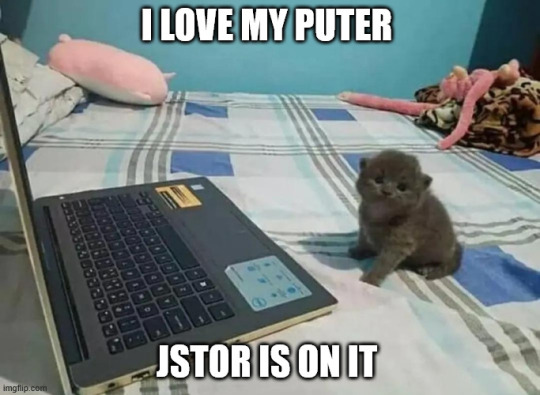JSTOR is a non-profit digital library for the intellectually curious. We help everyone discover, share, and connect valuable ideas. Official account. JSTOR.org | About
Don't wanna be here? Send us removal request.
Text

i wanna know what 20 year old dehydrated research assistant runs the @jstor tumblr account. show yourself, gandalf.
696 notes
·
View notes
Text
Bite sized info! And sooo much of it is open access!
Get searching :)
I know there are people out there genuinely struggling with shortened attention spans and doomscrolling but I cannot relate bc jstor is right there. Doomscrolling? No, academic paper scrolling. We are reading about coming of age rites in ancient Greece and changing uses of allegorical imagery in the baroque period and 16 other cool articles we found on the way to those. Attention span issues? Most articles are less than 50 pages. I can get through a long one broken up throughout the day without any effort or pound 5 shorter ones back to back in one sitting if I really feel like. Its even on your phone so instead of other shit you can jstor instead. Also I'm sure to spend at least 10 minutes during one of these bouts just sitting there digesting some crazy fucking thing I've read like this

Like I don't have attention span issues anyway but I can't help but think a lot of people who are stuck on their phones and have trouble doing things that aren't mindlessly consuming content could get a much better alternative if they just scrolled jstor instead-- its all the same actions but like mentally stimulating instead of brain-cell-killing. And like you don't even need to pay, you can get like 100 free articles a month. Anyway

2K notes
·
View notes
Text
No all of the above option?
CITATION STYLES THUNDERDOME
#jstor#this poll might be of interest to you all#we as the org couldn't possibly choose#as the mod i've used only really used MLA and APSA (which is a political science variation of Chicago)
5K notes
·
View notes
Text




Today we bring you a few lovely bookplates, designed by Frederick Garrison Hall (1879–1946)! Hall was an architect by trade but is better-known for his etchings.
These images are from the Cleveland Museum of Art's open access collection, available to browse on JSTOR (1, 2, 3, 4).
All I know is, I definitely don't need to adorn the books in my personal library with a stamp like these, but that won't stop me from exploring some of my options...
617 notes
·
View notes
Text

Known today as the basis for adorable trinkets and collectables, Kewpie dolls and cartoons were a wholesome cultural phenomenon. Artist Rosie O'Neill described Kewpie as “a benevolent elf who did good deeds in a funny way" in her autobiography.
Wholesome though they were, O'Neill also used her Kewpie characters to promote women's suffrage, critique elitism, and advocate for marginalized communities. In particular, Kewpie lent celebrity to the suffragist cause and helped reshape feminism in the popular imagination.
Image: Special Collections at Johns Hopkins University. Kewpie: Votes for Women. 2019-08-15.
#jstor#johns hopkins university#rosie o'neill#kewpie#cartoon#20th century#popular culture#women's suffrage#feminism#feminist history
612 notes
·
View notes
Note
Are you an official JSTOR account? If so, sending my thanks for the research papers you've helped me do over the years
If not, you can have em anyway. Doesn't bother me any.
We're official!
121 notes
·
View notes
Text
Searching best practices on JSTOR
Hi Tumblr researchers,
As promised, we're going to dive into some best practices for searching on JSTOR. This'll be a long one!
The first thing to note is that JSTOR is not Google, so searches should not be conducted in the same way.
More on that in this video:
youtube
Basic Search on JSTOR
To search for exact phrases, enclose the words within quotation marks, like "to be or not to be".
To construct a more effective search, utilize Boolean operators, such as "tea trade" AND china.
youtube
Advanced Searching on JSTOR
Utilize the drop-down menus to refine your search parameters, limiting them to the title, author, abstract, or caption text.
Combine search terms using Boolean operators like AND/OR/NOT and NEAR 5/10/25. The NEAR operator finds keyword combinations within 5, 10, or 25 words of each other. It applies only when searching for single keyword combinations, such as "cat NEAR 5 dog," but not for phrases like "domesticated cat" NEAR 5 dog.
Utilize the "Narrow by" options to search for articles exclusively, include/exclude book reviews, narrow your search to a specific time frame or language.
To focus your article search on specific disciplines and titles, select the appropriate checkboxes. Please note that discipline searching is currently limited to journal content, excluding ebooks from the search.
youtube
Finding Content You Have Access To
To discover downloadable articles, chapters, and pamphlets for reading, you have the option to narrow down your search to accessible content. Simply navigate to the Advanced Search page and locate the "Select an access type" feature, which offers the following choices:

All Content will show you all of the relevant search results on JSTOR, regardless of whether or not you can access it.
Content I can access will show you content you can download or read online. This will include Early Journal Content and journals/books publishers have made freely available.
Once you've refined your search, simply select an option that aligns with your needs and discover the most relevant items. Additionally, you have the option to further narrow down your search results after conducting an initial search. Look for this option located below the "access type" checkbox, situated at the bottom left-hand side of the page.
Additional resources
For more search recommendations, feel free to explore this page on JSTOR searching. There, you will find information on truncation, wildcards, and proximity, using fields, and metadata hyperlinks.
4K notes
·
View notes
Note
Hello Mod! Hope you're having a good day!
I was wondering if you could help me find some resources, but it's kind of niche so no problem if you don't know how to help 😅
The topics are:
- lifestyle/day to day life in medieval England, as well as 1800's England
- anything about general university life in 1800's England (for teachers & students), but also specifically in subjects like history/social history/medieval studies
- maybe also some info on classism/elitism/ableism in 1800's English higher education institutions/universities
I have no idea where to even start with what to search on jstor; can you advise me how should I go about this? Thank you so much for your time🙏
Hi there!! These are super interesting topics, and this is a great opportunity to share a previous post we made containing some JSTOR search tips.
Hopefully this will help you locate what you need!
40 notes
·
View notes
Note
Just wanted to say thank you for providing and protecting free literature for the public.
JSTOR Has been invaluable to my research in university and honestly I want to smooch every staff member but i’ll settle for just thanking you, JSTOR tumblr Mod <<33
Thank YOU for the kind words! We're glad to have helped with your research.
124 notes
·
View notes
Note

No longer a student but JSTOR helped me out quite a lot when I was, so have a meme as appreciation :D
(the meme is described in the alt text)
The kitten 😭
490 notes
·
View notes
Text
In a new article from JSTOR Daily, history professor Nicole Donawho discusses the daily struggle of students to evaluate primary sources. She notes that students fail to consider historical actors as holistic, real people, thereby missing the crucial context around historical documents.
She also offers a few great exercises designed to teach students the kinds of questions they should be asking as they interrogate each source.
Have a read!
#jstor#jstor daily#primary sources#pedagogy#let us know if you've seen this in your teaching/librarianship#or if you're a student/researcher using primary sources in your research!
366 notes
·
View notes
Note
Questions for The Mod
Hello again I made the question about your rabbit hole topic (forgot I had an anonymous thing on). Now I have a few more questions, what title do you prefer to be called like are you okay with The Mod or is there another you would prefer? What got you interested in "the aesthetic and politics of melancholy in modern literature"? And how did you come about holding the position of being the mod of the JSTOR blog?
Sorry if that's a lot.
"The Mod," "mod" - anything like that is fine!
I’ve always been interested in “the sad" as represented in music, photography, literature, TV, or other media. I’m drawn to explorations of grief, loss, etc. and only recently realized how much scholarship already exists around those themes. What fascinates me most is the way a turn of phrase or one singular word can carry so much aesthetic and emotional weight. These constructions produce an image or feeling, and I have visceral reactions to them that I want to better understand. Over time, I also became curious about how these emotional expressions are shaped by the times in which they were created. The socioeconomic and political conditions behind them are, in my opinion, a necessary access point to the deeper understanding I'm working at.
As for the JSTOR Tumblr blog, I’m part of the larger marketing team at JSTOR and running the blog is part of my role! It’s been a great way to bring a bunch of my random interests together.
62 notes
·
View notes
Text




Today we bring you a few lovely bookplates, designed by Frederick Garrison Hall (1879–1946)! Hall was an architect by trade but is better-known for his etchings.
These images are from the Cleveland Museum of Art's open access collection, available to browse on JSTOR (1, 2, 3, 4).
All I know is, I definitely don't need to adorn the books in my personal library with a stamp like these, but that won't stop me from exploring some of my options...
617 notes
·
View notes
Note
Hello Jstor's blog mod!
I've read that you're interested in the aesthetic and politics of melancholy in modern literature! That sounds so cool!
I wanted to ask you if you have some paper and books to recommend about it to someone who doesn't know a lot. I'm also very interested in history of arts so if you have something that touches it too that would be awesome!!
Sorry for my bad English and thank you very very much, I love your blog and I would have never managed to complete my uni studies without Jstor! :)
Hi there!
Sianne Ngai's Ugly Feelings (on JSTOR, not open access) and Jonathan Flatley's Affective Mapping (also on JSTOR, not open access) really helped me get a handle of affect theory, especially in the context of modern literature.
Walter Benjamin's The Work of Art in the Age of Mechanical Reproduction (not a JSTOR link) is a foundational take on how art changed as industrialization took hold. Not saying I agree with everything in the essay, but it seems relevant to your history of the arts interests!
186 notes
·
View notes
Note
What are your pronouns? Apologies if this has already been answered
Thank you for asking! My pronouns are she/her.
#jstor#ask#though given the nature of this blog i totally understand if one doesn't get it quite right :)
94 notes
·
View notes
Note
What does your dashboard look like? What sort of blogs does jstor follow?
We follow a bunch of our followers, a few of the libraries we've been able to locate on here, plus a bunch of history accounts!
My personal dashboard is another story entirely, however
#jstor#ask#P.S. every day i await the return of the boop feature. my team knows i need a giant time block each boop day to boop everyone back.
131 notes
·
View notes
